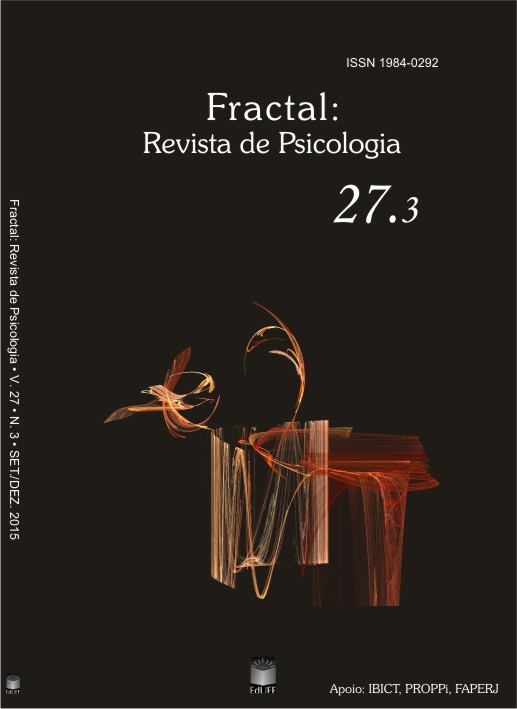Quelle place dans quelle famille : Que disent les parents de leurs enfants ?
Palavras-chave:
parents, enfants, norme, institution, socio-cliniqueResumo
La norme produit-elle un « mauvais » ou un « bon » enfant inscrit dans des configurations familiales et sociétales en mutation ? Produirait-elle des enfants à leur place dans la relation qu'ils entretiennent à la génération précédente ? Les pratiques éducatives familiales, au croisement des injonctions sociétales – conscientes et inconscientes – et des petits arrangements familiaux entre conflits et sérénité, déclenchent des mouvements constants qui laissent, parfois, les parents et les enfants déstabilisés par un « jeu » d'interférences entre égalité et hiérarchie, ancré à un maillage institutionnel.
Downloads
Referências
AUSTIN, J-L. Quand dire, c’est faire (1962). Paris: Seuil, 1991.
BOWLBY, J. Attachement et perte. Vol 1, L’attachement. Paris: PUF, 2002.
CADORET, A. Des parents comme les autres: homosexualité de parenté. Paris : Odile Jacob, 2002.
CASTORIADIS, C. L’institution imaginaire de la société (1975). Paris: Seuil, 1999.
DIASIO, N. Comment l’enfant fait-il la famille? Revue des Sciences Sociales, n. 41, 2009. “Désirs de famille, désirs d’enfant”.
ELIAS, N. La société des individus. Paris: Fayard, 1989.
FRANCE. Loi n° 2002-305 du 4 mars 2002 relative à l’autorité parentale. 2002. Disponible en : <http://www.legifrance.gouv.fr/affichTexte.do?cidTexte=JORFTEXT000000776352&categorieLien=id>. Consulté le : 10 set. 2015.
GAUCHET, M. L’enfant du désir. Le Débat, n. 132, p. 98-121, 2004. Dossier “L’enfant-problème”.
GIRARD, A. Situation de la famille contemporaine. Économie et Humanisme, 1er semestre, p. 3-48, 1957.
LOURAU, R. L’analyse institutionnelle. Paris: Minuit, 1970.
MEIRIEU, P. École maternelle, école première. In : Congrès de l’AGEEM, Tarbes, 5 juil. 2008. Disponible en : <http://www.meirieu.com/ARTICLES/ecole_maternelle_ecole_premiere.htm>. Consulté le : 10 set. 2015.
NEYRAND, G. Ambiguïtés de la valorisation de la coéducation à une époque de sur-responsabilisation parentale. Recherches familiales, n. 12, p. 279-287, 2015. Disponible en : . Consulté le : 10 set. 2015.
REVAULT D’ALLONNES, C. et al. La démarche clinique en sciences humaines. Paris: Dunod, 1989.
SEGALEN, M. A qui appartiennent les enfants ? Paris: Tallandier, 2010.
SELLENET, C. La parentalité décryptée. Paris: L’Harmattan, 2012.
WEBER, F. Manuel de l’ethnographe. Paris: PUF, 2009.
WINNICOTT, D. Jeu et réalité (1971). Paris: Gallimard, 2002.
Downloads
Publicado
Edição
Seção
Licença
Autores que publicam nesta revista concordam com os seguintes termos:
- Autores mantém os direitos autorais e concedem à revista o direito de primeira publicação, com o trabalho simultaneamente licenciado sob a Creative Commons Attribution License que permitindo o compartilhamento do trabalho com reconhecimento da autoria do trabalho e publicação inicial nesta revista.
- Autores têm autorização para assumir contratos adicionais separadamente, para distribuição não-exclusiva da versão do trabalho publicada nesta revista (ex.: publicar em repositório institucional ou como capítulo de livro), com reconhecimento de autoria e publicação inicial nesta revista.

This work is licensed under a Creative Commons Attribution 4.0 International License.

Na medida do possível segundo a lei, a Fractal: Revista de Psicologia renunciou a todos os direitos autorais e direitos conexos às Listas de referência em artigos de pesquisa. Este trabalho é publicado em: Brasil.
To the extent possible under law, Fractal: Revista de Psicologia has waived all copyright and related or neighboring rights to Reference lists in research articles. This work is published from: Brasil.



